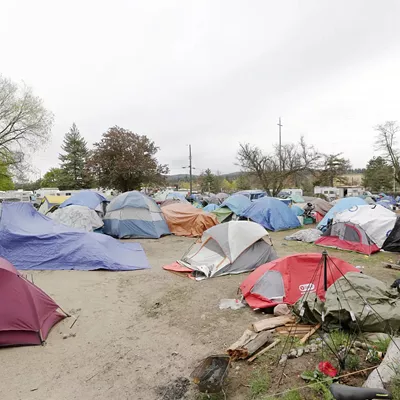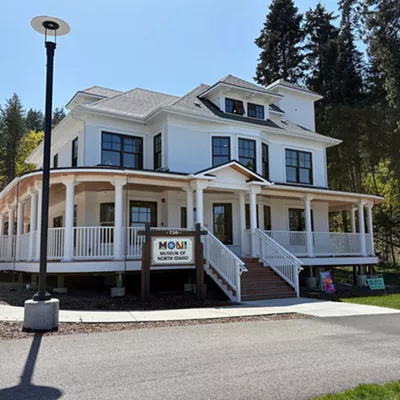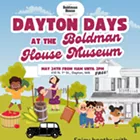On a cold March morning, I'm riding the bus with my friends Linda and Emily. We board the #43 Lincoln/37th Avenue bus and ride to the end of the line at Regal, then turn around and ride all the way back downtown to the Plaza. Instead of keeping to ourselves like good bus-riding introverts, however, we engage other riders in conversation, asking what they think about the proposed cuts to local bus service - including the elimination of the #43 route.
If you've been following the local news for the last few months, you know that the Spokane Transit Authority (STA) has proposed a budget for the year beginning in July 2004 that will require cutbacks of about 40 percent. These cutbacks will severely curtail evening and weekend service while totally eliminating selected routes. You probably know as well that Spokane voters will go to the polls on May 18 to vote on a proposal to increase the sales tax by 0.3 percent to make up the difference in STA funding. (For those with a weak math gene, the increase amounts three cents on a $10 purchase.)
You may not know that a local citizen group, the Spokane Alliance, is working hard on the campaign to pass the sales tax increase. The Alliance is made up of religious institutions, education associations, union locals and other interested groups. Led by a team of volunteers from its member institutions, the Alliance works on issues that emerge from the stories told among the members. In January, the Alliance began a grassroots campaign to pass STA funding.
My friends are volunteers with the Alliance, and our early morning bus ride was just part of that campaign. During the first week of March, Alliance volunteers fanned out across STA's service area, gathering stories from bus riders about how the proposed cuts would impact their ability to get around. The volunteers urged bus riders to vote for the increase and encouraged voter registration if a rider was not registered; two member institutions staffed a voter registration both in the Plaza during the week. While getting the word out to bus riders about the campaign, the Alliance sought to get information flowing in the other direction as well.
"We used to communicate with each other by way of stories, and we've lost that aspect in our society," says Tom Robinson, an attorney and certified professional guardian who is an Alliance volunteer through Covenant United Methodist Church. "The bus riding came out of a desire to help put a face on this issue. Too many times, we look at just the dollars and cents of an issue. We wanted to be able to go back to our institutions with these stories, so they could hear about the woman who needs the bus to get to work, or the disabled who rely on it to continue working."
On the bus, a few people shared their stories with us. A couple of elderly folks who can no longer drive rely on the bus to stay mobile. One young foreign exchange student takes the bus every day from her apartment on the South Hill to the Riverpoint campus downtown. Richard chooses to take the bus rather than drive, to reduce air pollution and get to know his neighbors. Melvin, a student at Shaw Middle School, needs the STA bus to get to his early morning basketball practices because his family does not own a car.
At the Plaza, a woman sat waiting with her young daughter. She's a welfare recipient who rides the bus every day for school, for work and for shopping. She recently interviewed for a position that will require her to work until 10 pm or later.
"The people who ride the bus are the ones who keep the economy going," she told us. "We're the ones that make the doughnuts and make the cakes and sweep up and clean up. If you eliminate the bus, how can we get to work?"
People coming off welfare and people coming out of the prison system face similar problems, says Tom Robinson.
"Our philosophy as a society is reintegration, but we make it difficult for people to do that," he says. "They come out with no money, no contacts, and if they do land a job, then we take away their only way of getting there? It really does take all of us to make our society work."
The loss of evening and weekend service would further separate people from one another, Robinson says.
"An incredible number of people rely on this system," he points out. "If there's not a way to inject people into cultural events, then we become people living near each other rather than people living with each other. That contributes to the fractionalization of society."
There's nothing like wandering around Spokane on foot to give one an appreciation for good, reliable bus service. An unspoken class divide does exist here - and in most other places in this country - between those who travel by car and those who rely on mass transit and their own feet. Many people choose to ride the bus, even though they are among the automotively endowed, because it reflects their values of sharing society's resources. But bus service assumes a whole different level of importance when the only other option is foot travel. For those whose lives unfold without a car, bus service determines much of what they can and cannot do.
Our mass transit system reflects how we feel about ourselves as a community. What message do we send with the system that we choose?
Disclosure: From November 1999 to February 2001, the author was a part-time employee of the Spokane Alliance; her church community is one of the Alliance's member institutions.
Publication date: 04/01/04
















